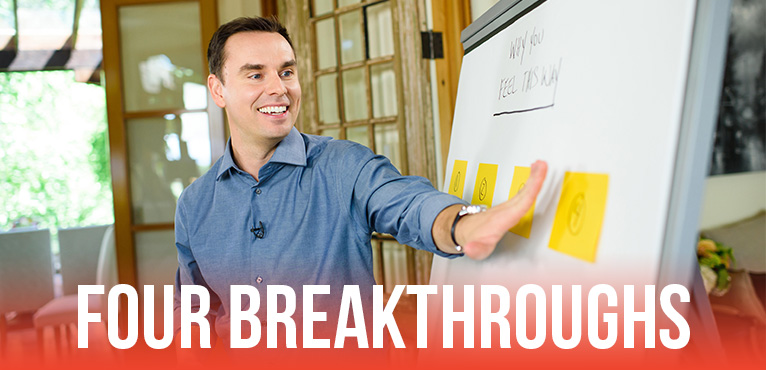Summary
Whatever it is, the advice can be difficult to embrace.
However, whether you’re facing something stressful or uncomfortable, or you’re interested in being more mindful, thoughtful and present in the world, self-acceptance is the key starting point.
Here are some simple things to think about:
1. Self-acceptance is a power. Self-acceptance is weaponry in life. When you can accept things, you are stronger than others.
2. Self-acceptance is not approval. Acceptance isn’t about liking something or approving of something. Rather, it’s about peace. It’s learning to be at peace with what is, even if you don’t like it and especially if you can’t change it. For example, you don’t have to necessarily approve of the medical results you received, or someone screaming at your constantly. But acceptance will allow you to tap into peace even as you strive to improve a situation.
3. Self-acceptance requires trust and forgiveness. Trust that you are capable, that things will get better, that this too shall pass, and that you can handle whatever comes your way. And forgive yourself for any actions you regret. Trust and forgiveness make space for self-acceptance.
4. Self-acceptance is social. If you find yourself fighting something in your life and resisting acceptance, what would you advise a friend to do who’s going through a similar situation? If they continue to fight against it, you’d want them to experience peace with the situation, and you’d try to comfort them, right? Let the hypothetical scenario of supporting others guide you in supporting yourself. To take it further, when you can’t accept a situation or yourself, talk with others about it. Their point of you can help you find a faster path to peace.
Watch the video above for the full lesson so that you can continue living #TheChargedLife!
Want more training? Join Brendon LIVE at High Performance Academy!
Like this episode? Please share it! My blog, videos and podcast are ad-free ONLY because you share my work!
Complement with these previous posts:
How to Take Care of Yourself and Others
Can Authenticity Suck?
The Power of Personal Responsibility
The Declaration of Personal Power
How to Have More Confidence
Related quotes to consider:
[Follow Brendon on Instagram for tons of great quotes]
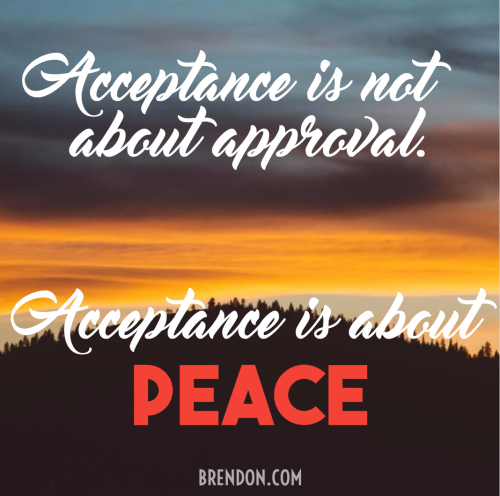
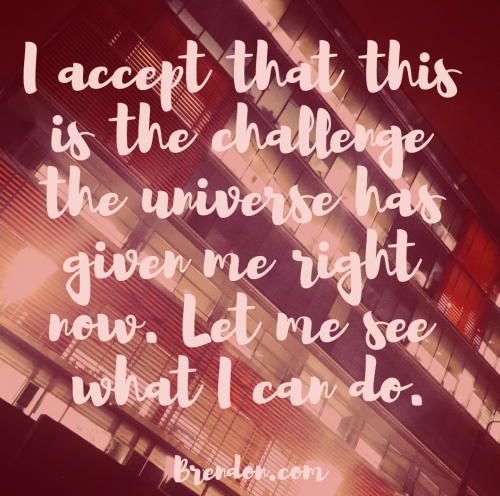
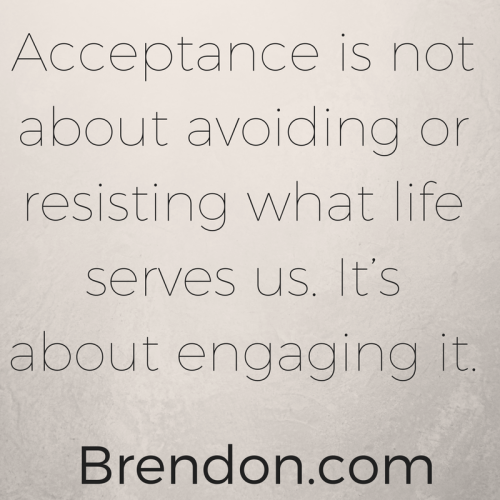
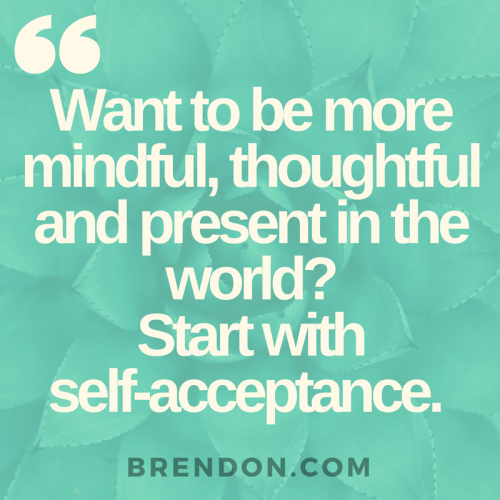
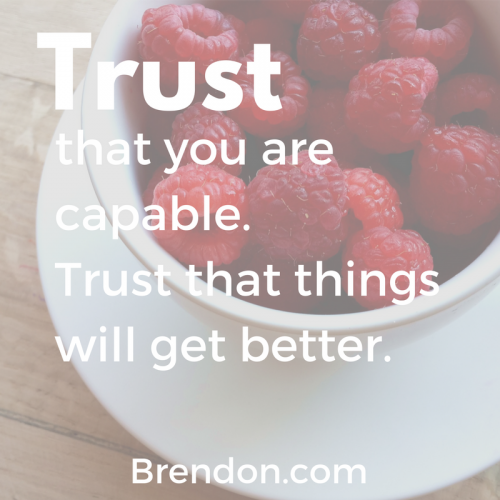
FULL TRANSCRIPT
[The following is the full transcript of this episode of The Charged Life with Brendon Burchard. Please note that this episode, like all TCL episodes, features Brendon speaking extemporaneously–he is unscripted and unedited. Filmed in one take, The Charged Life has become one of the most viewed unscripted, direct-to-camera self-help series in the history of Youtube. It has also been the #1 Podcast in all of iTunes and is regularly in the top podcasts in Self-Help and Health categories around the globe. Subscribe to the free motivational podcast on iTunes or Stitcher.)
- We must accept our lives
- We must accept the difficulties of our life
- We must accept and honor the struggles that we face
- We must accept a lot of things that we don’t even like or approve of.
But how exactly does one do that? Have you ever been told, “Well, it’s time for you to accept something,” leaving you upset because you don’t like the thing that you’re struggling with?
And how do you tell somebody to accept something from their past when it was difficult?
Somebody was mean to them, abused them, treated them badly, or a bad incident happened. Or they lost somebody they loved. It can be pretty flippant when someone says, “Well, just practice some self-acceptance, dude.”
Except you and I both know that they are usually right.
Is there something from your past that you haven’t dealt with yet?
Is there something going on right now that’s troubling you, causing stress and overwhelm, and refusing to go away?
It’s always going to be there.
If any of that rings true for you, then this might be a good time to think about the power of self-acceptance and this extraordinary ability we have in our mind and heart to deal with things that life has dealt us. I know it’s hard to hear this, but I also think this might be your next breakthrough.
When I work with a lot of executives or high-flying people who are not only extraordinarily capable and confident, but also stressed and upset, acceptance is one of their ways out.
When people are trying to become more mindful, thoughtful and present in the world, more self-acceptance is necessary.
Here are some simple things to think about when bringing more self-acceptance into your life:
#1 Self-acceptance is a power.
It’s time to develop that conception. Self-acceptance is a weaponry in life. When you can accept things, you are stronger than others. For example, let’s say somebody is sitting there screaming at you, being mean and being rude. When you take it personally and you’re not in acceptance of the reality of that situation, you’re more likely to fall into fight-or-flight mode, or argue relentlessly. That’s the type of situation that marks relationships wherein people fight over and over again; they’re not in acceptance of the other person, or the reality of the situation.
Sometimes, you have to accept another person’s position in life without trying to change them, just as much as you have to accept yourself without trying to change yourself.
Sometimes, you have to accept the past without trying to change it.
#2 Self-acceptance is not approval.
Of course, you don’t approve the person screaming at you. Of course, you don’t approve the bad situation that happened in the past or the bad medical report. Of course, you don’t accept the fact that sometimes life isn’t what you want.
Acceptance isn’t about approval; rather, it’s about peace. It’s learning to be at peace with what is, even if you don’t like it and especially if you can’t change it.
I will give you an example: I lost my father in 2009 to acute myeloid leukemia. When he got that diagnosis, it really tore through our family. My dad and our family were all so close, and we loved him so much. Not only did he receive that diagnosis, but we found out that he was going to pass away very soon. It was only 59 days between his diagnosis and his death. And so, it was hard to accept that. We had to accept that that was what was going to happen, and that we were going to lose someone we love.
All of a sudden, he was just sick out of nowhere, and then he was gone. And we had to accept that, that was part of the process.
It doesn’t mean that he didn’t fight, and that we didn’t try to do everything we could for him. In that amount of time, he did fight. He fought the good fight. He went through 3 different treatments, and we tried everything.
He had been a 21-year marine, so he’d been through it all. He’d been through Vietnam in three different tours. He’d been shot up.
He was a strong guy and he fought, but he was also a peaceful warrior. He was at peace either way.
He was going to do his best, but he was going to accept the outcome that God or the universe placed in his path at that time of his life, and it gave me strength. I tried to be the son coping with the situation, and I tried to be there for someone going through struggle. As much as they’re struggling and fighting it, it was an honor to see them accept the path and the hardships. It’s about accepting the path that I have right now. God, universe, whatever, put it in front of me. I’m going to do my darn best. I’m going to be here. I’m going to be present. I’m going to engage it. I’m not going to run. I’m not going to avoid it, but I’m also not going to hate it. I’m not going to add negative fuel to a negative situation. Instead, I’m going to peacefully and persistently give my best right now. I’m not going to hate or resent the process. I accept that this is the challenge the universe has given me right now. Let me see what I can do.
That’s a much more positive mindset than avoiding it.
Avoidance is a great short term strategy to avoid pain and discomfort, but it’s also a great long-term strategy to guarantee suffering.
It’s not about avoiding or resisting what life serves us. It’s about engaging with it.
Do your best. Don’t hate the process. That’s acceptance too, right?
#3 Self-acceptance requires trust and forgiveness.
Trust that you are capable. Trust that things will get better. Trust that this too shall pass. Trust that whatever is here not only has been put here, but it is something that you can deal with.
If you survive it, then there was a reason. You learned something. You developed something. Even if right now it sucks, or it’s painful, or if you’re sad about it, you will get better over time.
I also had a brain injury in 2011 that was incredibly difficult, leaving a 2-year swath of pain in my life. It was a very difficult time when I was trying to overcome my brain injury, trying to get back in the game, trying to build my business and my career, trying to write a book. I was trying to do all these things you’ve seen me do. It was just all-round bad.
But I decided to accept that I will repair myself. It might take a long time, but I will repair myself. I trusted that if I focused, if I stayed persistent, and if I kept trying, I would get better over a period of time.
Even if it didn’t change physically, I was going to free my mind by accepting that this was where I was at.
Self-acceptance requires not only requires trust, but it requires forgiveness. Maybe it’s time to forgive that time you did that dumb thing. Maybe it’s time to forgive that time you just hated yourself for doing something. Maybe it’s time to let go.
#4 What would you tell your friend?
If you find yourself fighting something in your life, and resisting acceptance, what would you advise a friend to do who’s going through a similar situation?
You’d probably say, “Hey, do your best. Remember to trust, have faith and believe.” Wouldn’t you say something like that?
If they continue to fighting against it, you’d want them to experience peace with the situation, and you’d try to comfort them.
So, what about giving yourself some peace? What about comforting yourself? What about accepting the fact that you know you’ve probably been doing your best? What about accepting the fact that when you screwed up, you hurt somebody’s feelings?
You’re in a better place now. You’re older, more mature, more capable now.
I think of self-acceptance in those ways. Self-acceptance means that I can engage the process without hating it. I can trust that this is here for a reason, and has the potential to call upon the best of me. I also think that what’s integral to acceptance is forgiveness of the things that I did or others did so that now in this moment, I can be free. After all, that is the benefit of acceptance: freedom.
Whether you accept another person you’ve been arguing with or upset with and you finally accept that’s the way they are or that’s how it’s going to be, it’s freeing because now you don’t have to carry along the anger and resentment.
No need to be bitter or upset. Rather, you can exist at a peaceful level, offering empathy and compassion. You can trust that this is all happening just as it’s supposed to, and you can continue doing your best.
When you use these lenses, self-acceptance becomes power and that power gives you freedom, it gives you peace in the moment, and it gives you better choices for tomorrow. When you have better choices for tomorrow, you start to experience what we call The Charged Life.

